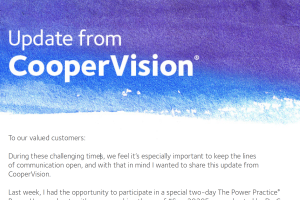It is completely understandable that COVID-19 is the main, and almost the only news-topic global media are focusing on at the moment. This brings with it enormous amounts of information and advice on a daily basis. That information ranges from credible, evidence-based sources, to more speculative and sensationalist reporting. As we all try to come to terms with implementing advice on the best ways to reduce the spread of the disease, inevitably the topic of contact lens wear is raised. Is it safe to continue wearing contact lenses? Do glasses provide any protection? It is crucial to base the answers to these questions on scientific fact.

A recent peer-reviewed publication from five prominent ocular scientists helps eye care practitioners instruct and reassure contact lens wearers during the global COVID-19 / coronavirus pandemic. Published in Contact Lens & Anterior Eye, “The COVID-19 Pandemic: Important Considerations for Contact Lens Practitioners” delves into multiple aspects of eye health amidst the global health crisis, with a specific emphasis on the safe use of contact lenses.
“Our findings indicate that contact lenses remain a perfectly acceptable form of vision correction during the coronavirus pandemic, as long as people observe good hand hygiene and follow appropriate wear-and-care directions,” said Dr. Lyndon Jones, director of the Centre for Ocular Research & Education (CORE) at the University of Waterloo and the paper’s lead author.
Based on the paper, CORE has developed five facts (also available as a downloadable infographic) for eye care practitioners to share with anyone who relies on contact lenses or glasses:
1. People Can Keep Wearing Contact Lenses. There is currently no scientific evidence that contact lens wearers have an increased risk of contracting COVID-19 compared with glasses wearers. Patients should consult their eye care practitioners with questions.
2. Good Hygiene Habits are Critical. Thorough handwashing and drying are essential, as well as properly wearing and caring for contact lenses, ensuring good contact lens case hygiene, and regularly cleaning glasses with soap and water. These habits will help wearers stay healthy and out of their doctor’s office or hospital, thereby minimizing impacts on the wider healthcare system.
3. Regular Glasses Do Not Provide Protection. No scientific evidence supports rumors that everyday glasses offer protection against COVID-19.
4. Keep Unwashed Hands Away from the Face. Whether people wear contact lenses, glasses or require no vision correction at all, individuals should avoid touching their nose, mouth and eyes with unwashed hands, consistent with World Health Organization (WHO) and U.S. Centers for Disease Control and Prevention (CDC) recommendations.
5. If You Are Sick, Temporarily Stop Wearing Contact Lenses. Contact lens wearers who are ill should temporarily revert to wearing glasses. They can resume use with fresh, new contact lenses and lens cases once they return to full health and have spoken with their eye care practitioner.
On April 8, the CDC issued updated guidance on contact lens wear during the COVID-19 pandemic, further supporting key findings from the Contact Lens & Anterior Eye paper. The CDC additionally points out that personal eyeglasses and contact lenses do not qualify as personal protective equipment (PPE).
While access to routine optometric care is significantly altered during the height of the pandemic, eye care practitioners can take steps to help their contact lens wearers practice correct hand hygiene, lens and case care habits. New advice involves reminders for all patients to avoid touching the eyes, nose or mouth with unwashed hands, and to regularly clean glasses frames with soap and water. COVIDEyeFacts.org is an independent evidence-based resource for eye care practitioners to use to keep themselves up to date with new information as it is produced during this fast-changing situation.







